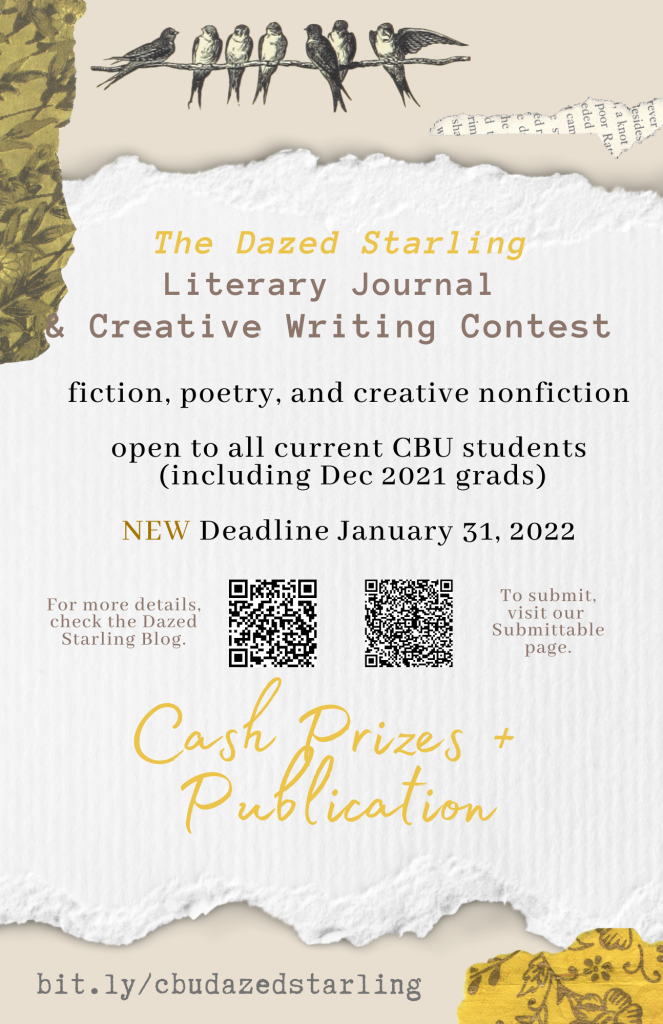
Deadline Extended!
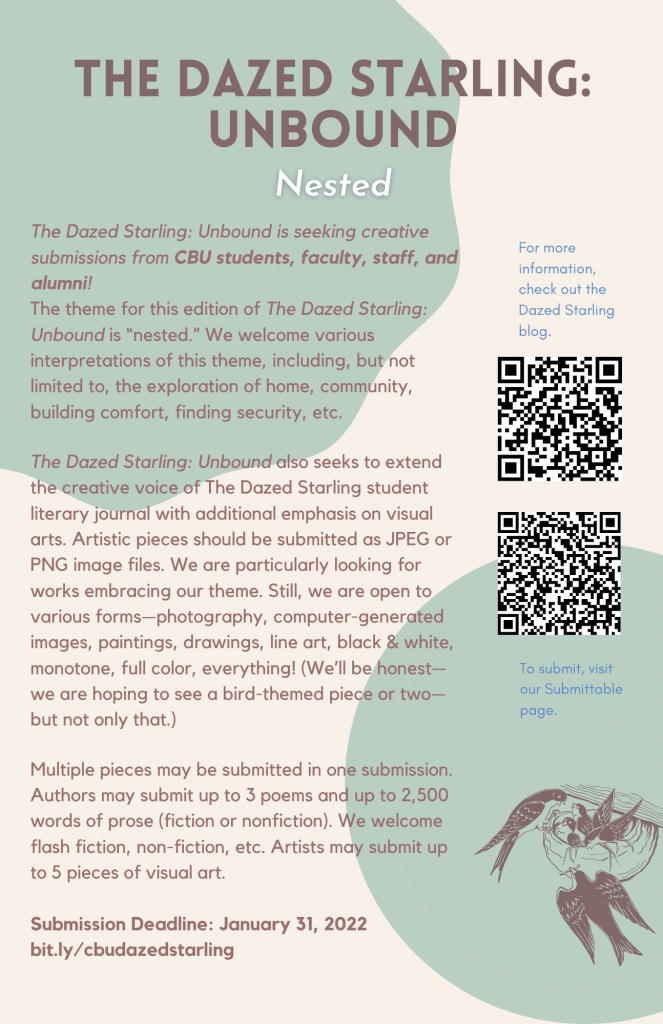
Storytelling
By Yage Wang
Everyone loves stories. As we might notice or not, almost everything that we care about in our daily lives is composed in the form of a story, such as games, gossip, tv shows, news, and even posts on social media. Until today, the film industry and fiction writing have come across hundreds of years of examination and development to walk us. It is a remarkable journey. However, despite the rise of the retro trend, readers (or story lovers) cannot use the same-old appreciation to give critiques anymore. Stories are evolving, so should our evaluation of those literary-based works.
Today we will introduce terminology that describes the structure of stories: Kishōtenketsu. It usually includes four parts of storytelling: introduction, development, twist, and conclusion. Not easy as it sounds, Kishōtenketsu can bear the phase of “twist” according to the author’s creativity and logical ability.
A great example will be Christopher Nolan’s Tenet (2020). The reason for the “great” denotation is that people usually consider movies as productions of affectionate literary works, like Romeo + Juliet (1996), Casablanca (1942), etc. However, Nolan uses this stereotype to pull out a story of justice’s origin. It breaks off the traditional and emotional storytelling on the inheritance of justice, kindness, and heroism. Still, it digs in-depth into the philosophy of consequentialism. This movie challenges the audience’s habit of watching movies with their eyes and heart. For example, we tend to be sad when we see the protagonist cry, and we would likely sigh when we see good people die. Instead, the director deliberately downplayed the emotional resonance of the audience and encouraged us to watch the movie rationally. All in all, Tenet uses a rational attitude to explore a perceptual theme, and that’s Nolan’s innovation on the “twist.”
If you’re interested in developing a short fiction, consider enabling Kishōtenketsu in your story, take some time on polishing, and maybe submit it to us in the following spring Dazed Staring collection.
Happy Writing

Manga: Changing the Way We See Literature
By Yage Wang
While people’s production and entertainment are on hold, 2021 seeks new breakthroughs and innovations in creating literature and drama, that is, the prosperity of manga. While manga is not a new genre, trends in publication and book-to-film crossover, has brought manga (and other types of graphic novels) into the spotlight. Giving credits in particular to Netflix’s marketing, several previously niche anime have gained their spotlights this year. In Japan, they have manga like Attack on Titan, Beasters, and Jujutsu Kaisen. These works challenge expectations for culture in the traditional sense and add artistic, political, and philosophical metaphors. Tell us about your favorite manga or visual artwork for a writing prompt. Please choose one line from this manga that has either surprised or inspired you thoroughly if you would like to. Elaborate your reason for selecting this quote, share with us about your bias.
For instance, my quote will be from One Piece. It takes place in a scene after radical racial conflict, someone needs blood donation: “Whether you hurt somebody, or somebody hurts you, the same red blood will be shed. It hardly seems like a path because it’s a very thin and narrow tube–but it makes its way through the prejudice that makes people fear for each other and blood feuds, so very easily. This is a path towards a very real sun, not some empty wish.”
Happy Writing!
Dazed Starling 2022 Open For Submissions!
Submit your poetry, fiction, or creative nonfiction to The Dazed Starling for possible publication in the Spring 2022 Issue!
Current CBU undergraduate and graduate students, including December 2022 graduates, may submit multiple pieces in multiple categories, but please observe the overall limits below:
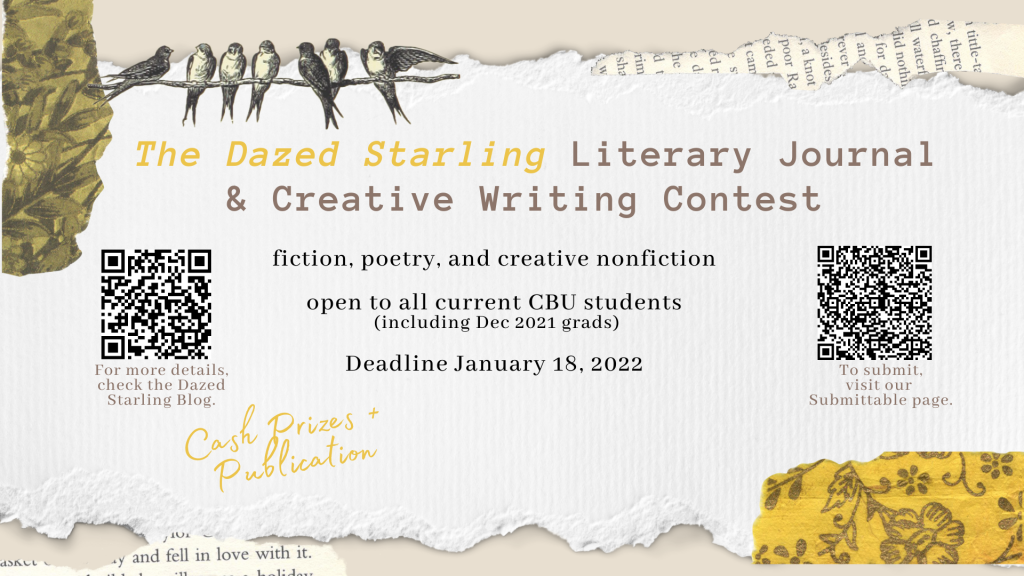
FICTION (Including Flash Fiction): 20 double-spaced pages max (5,000 words max)
POETRY: 5 pieces
CREATIVE NONFICTION: 20 double-spaced pages max (5,000 words max)
Submissions should be grouped by category, but please submit each entry as an individual file.
- For example, if you would like to submit 5 poems and 2 short stories:
- Save each work as it’s own Word/Rtf File with no personal information in the file.
- Submit the 5 poetry files all at once.
- Then submit the 2 short stories together.
Each student can submit to each of the categories once, so prep all of your files before submitting.
No personally identifying information should be on the submission file–only the title and the work itself should be included in the file (Word/rtf).
**If you’re not a current student, considering submitting The Dazed Starling: Unbound, which publishes works from current students, alumni, faculty, and friends of the university (including visual art).
Advent: Waiting, Expecting, and Writing
By Yage Wang
The campus kindled the tallest pine tree in the front lawn on December 2nd. Students gathered with candles in their hands, witnessing a moment of ritual beauty, a moment of celebration for hope being born on the land. In the season of advent, the important message is usually forgotten. The beauty of advent is about waiting, expecting, and receiving.
Thousands of years before Jesus was born, the Bible had already foretold the befall of this gracious and merciful gift. In Isaiah 7:14, it says, “Therefore the Lord himself will give you a sign. Behold, the virgin shall conceive and bear a son, and shall call his name Immanuel.”
Still, in 2021, it’s surprising that this verse carries profound love and blessings, which is far more than a cold revelation. Similarly, how can we write something hopeful for the future self? How can we manifest this blissful whisper of life to the next year? Amid the pandemic, writing is another expression that gives us time to polish and compose. In this advent, let’s start writing with “This year, ( ) was a great blessing to me. Next year, I hope ( ) will be a goal in my future.” Or, we can jot down our current status for the future self to review.

The Dazed Starling: Unbound Advent 2021
Dear Readers,
Thank you for joining us for our first Advent edition of the Dazed Starling: Unbound. In years past, we haven’t been able to have both a fall and spring publication, but thanks to our growing program and technological advances, we’re excited to expand the space for creative expression here at CBU.
Advent is the traditional time of preparation for the celebration of the birth of Christ. In the weeks leading up to Christmas, the lighting of candles, singing of carols, and reading of Scriptures remind us that the miracle of the Incarnation is rooted in and produces hope, faith, joy, and peace. And that no matter how dark the world may seem, the Light has come into the world, and that Light will not be overcome.
So whether or not you light candles on an advent wreath, we invite you to enter into this season of anticipation with us. We hope these creative works encourage you and help you reflect upon the mystery and miracle of God’s great gift to us.
Merry Christmas,
The Dazed Starling: Unbound Editorial Team
View our digital edition here.
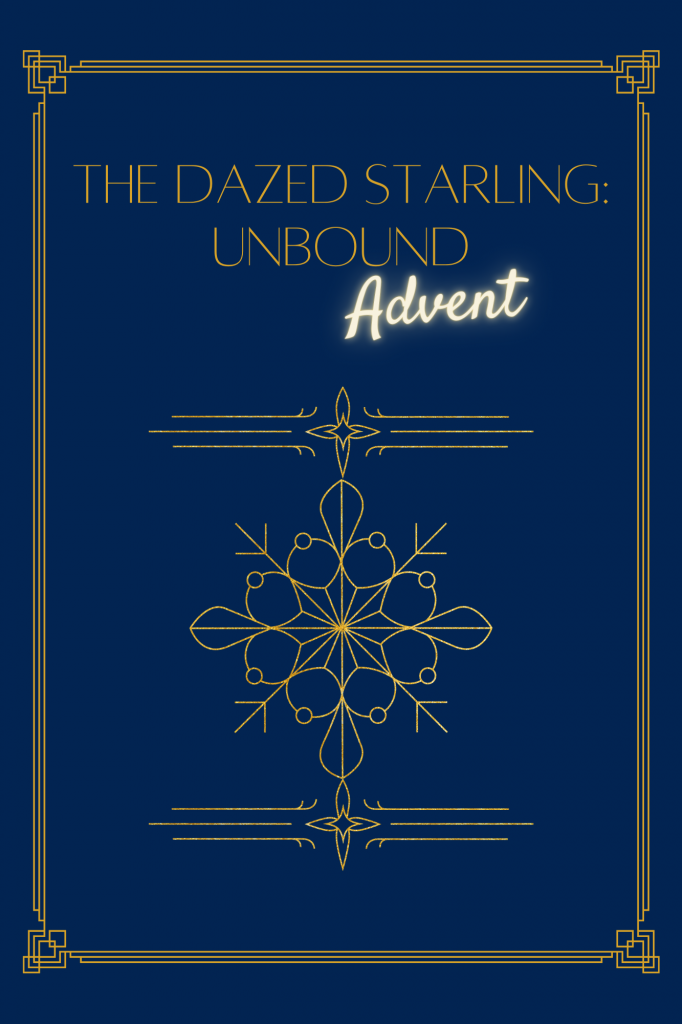
The Dazed Starling: Unbound Winter 2021 “Advent”
The Dazed Starling: Unbound is an online publication of the Bachelor of Fine Arts in Creative Writing program at California Baptist University. Its goal is to extend CBU’s Dazed Starling student literary journal’s mission by offering an additional publication opportunity open not only to current CBU students but also to faculty, alumni, and friends of the university. Each edition is thematic, but the editorial staff is open to an expansive interpretation of that theme. The editors will consider submissions in a wide variety of genres—poetry, fiction, and creative nonfiction, of course, but other writing (creative, critical, devotional, etc.) that might go beyond those categories.
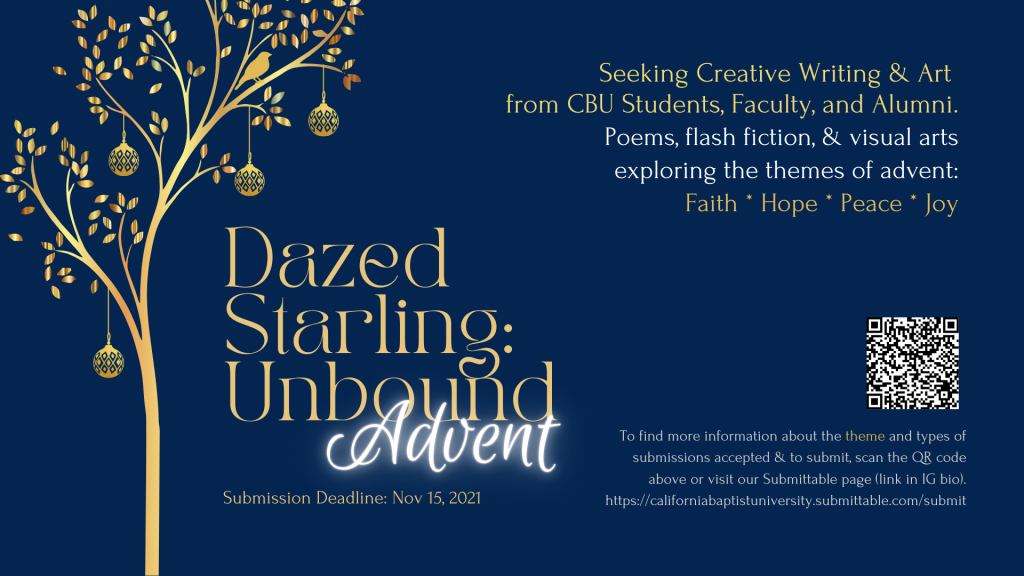
The theme for this winter edition of The Dazed Starling: Unbound is “Advent.” We welcome various interpretations of this theme that focus around faith, hope, peace, and joy. They need not be Christmas stories.
The Dazed Starling: Unbound also seeks to extend the creative voice of The Dazed Starling student literary journal with additional emphasis on visual arts. Artistic pieces should be submitted as JPEG or PNG image files. We are particularly looking for works embracing our theme. Still, We are open to various forms—photography, computer-generated images, paintings, drawings, line art, black & white, monotone, full color, everything! (Peace connected to the Advent theme are especially encouraged.)
Whether written or visual, all submissions must be previously unpublished with all rights held by the submitter. All submissions should consider the mission and spirit of the university.
Multiple pieces may be submitted in one submission. Authors may submit up to 3 poems and up to 500 words of prose (fiction or nonfiction–we’re looking for short pieces up to 250 words each). Artists may submit up to 5 pieces of visual art.
For more information or to submit, visit our Submittable site.
Surrendered Remnants
Amberly Rose Garcia
2021 CBU Creative Writing Contest Honorable Mention—Poetry
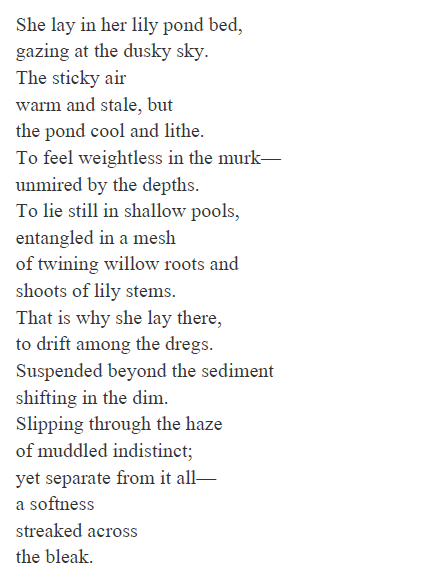

To the Girl Who Sees Dragons in the Clouds
Amberly Rose Garcia
2021 CBU Creative Writing Contest Winner—Nonfiction
“To the girl who sees dragons in the clouds” is a scrap of poetry I stumbled across on Pinterest. Meagan Spooner wrote the poem for the dedication of her novel Hunted. This phrase is the first and third lines pieced together. I pinned it to my inspiration board.
This Pinterest board exists to collect little particles of genius. It gathers gleanings from Google searches that make me think and explore differently. I paint, pace, and ponder these scraps of inspiration. They molder and then fester into a germ of an idea. Hopefully, they sweep me off into a creative spurring of motivation. This rarely happens. But this scrap of poetry stuck with me. I painted it on a cotton candy skyscape. You know, the puffy Pepto-Bismol clouds that exist in kids’ cartoons. It’s about the only thing I can paint without peering at it after and believing I’ve marred the pristine canvas.
I paint not because I am skilled or necessarily enjoy the product afterward, but because it releases some tension bundled beneath my sternum. Sometimes I need to press my thumb to the tension, to acknowledge it is truly there. The pressure from my thumb meets with the pressure in my chest, greeting each other in a kiss. Somehow this relieves the tension in the way touch always does, like falling back into my pillow, rubbing my face into my cat’s fluffy neck, and pushing myself into the crevice between my mother’s arms. So, among writing in cursive, doodling, tapping my foot, running my hands through my hair, dancing, and steeping in a hot bath until my palms are wrinkled, I paint to alleviate anxiety. All these things disembody me, if only for a moment, from the stifling pressures of existence.
The painting, with the poem scrawled over it, meshes with the sharpie outline of a dragon. Thick, inky wings and a furling tongue of flame spread from the dragon, clashing against the puffy pink sky. The dragon is regal, yet menacing. Its eyes are shaped like lightning bolts.
It’s been hanging on the wall next to my bed for about eight months now—a record-breaking time. I rarely keep anything up for that long. I’ve pondered those words, wondering what they meant to me. Why had I chosen to paint it? Many other snippets of inspiration were left to molder until they disintegrated into my unconsciousness. Why was this string of words any different?
The poem is addressed to the girl who sees dragons in the clouds. It’s supposed to render a whimsical effect as if the author is addressing her book to all those dreamy individuals discovering magic in the world. At first glance, I believed this to be its only meaning. A lovely little thought, letting you know that you’re not alone—the poem celebrating your lofty ideals and your charming quirks. But “to the girl who sees dragons in the clouds” has become more than just a whimsical phrase to me. Its scope spans beyond nostalgia ridden days or times spent cloud watching on grassy hillsides.
The poem is addressed to the girl who sees dragons in the clouds. It’s supposed to render a whimsical effect as if the author is addressing her book to all those dreamy individuals discovering magic in the world. At first glance, I believed this to be its only meaning. A lovely little thought, letting you know that you’re not alone—the poem celebrating your lofty ideals and your charming quirks.
Dragons are fearsome beasts. Storytellers of yore labeled them as malicious and greedy creatures. Dragons snatch up whatever they like, hoarding it away or eating it. For eight months, I have left the painting hanging up, pondering the phrase. I now analyze it differently and have discovered the meaning anew.
The other night, I cried. Bawled, actually. Hot tears seeped out and down my flushed face. My breath caught in my chest as I made odd little gasping noises, trying to gulp down oxygen. This kept on for an hour. I rarely cry. It’s so rare for me to cry that sometimes I crave it, especially when the pressure in my chest won’t relinquish its clench. I cried that night because I met a dragon.
You can detect dragons based on the steely glint in their eyes. Sometimes they’re dinosaurs with craggy skin and a shaky voice. They wobble towards you with a cane they would like to bang on your head. Sometimes they’re tiny terrors that scamper about, kicking up insults in their wake. Sometimes they have power over you. Sometimes you give the power to them. This dragon had power over me, but I gave her more power than she had.
I have a grocery store job that I dislike. There are many reasons why I dislike it, but I won’t smear them across this page in a long list. It doesn’t help. But it does help to list the things I like about it, such as getting a paycheck, allowing it as an excuse to step away from homework, and growing. I’ve done a lot of growing in the months I’ve worked there. I never thought that I would cry over my job, yet this is precisely what I did.
I was the only closer that night besides the cashier and manager. This new manager had different expectations than other managers I had closed with. Her expectations were higher and stricter. I became her henchman, scurrying about trying to get the checklist done that usually had three people completing its tasks.
Finally, the night was up. After crushing my toes with a massive steel sign, smashing my fingers, hauling in carts, and scrubbing down all but one check stand, I bid the dragon good night. She interrupted me, mid-sentence, complaining that the last check stand had not been wiped, and adding that I couldn’t leave until it was done, ignoring the fact we were closed, and I was technically allowed to go based on my schedule. With that sharp reprimand still steaming from her nostrils, she whipped away into her office, letting the door smack shut behind her. I hurried and wiped down the last check stand, scampered to the clock, and punched out. I had done what she asked; I was free from the dragon’s clutches.
However, as I headed towards the door, I saw the cashier wiping down the check stand I had just cleaned; the cashier had been in the back while I’d cleaned it. He usually helped me wipe down the check stands, so it wasn’t unusual. Just then, the manager came stomping out and told me that it’s not the cashier’s job to clean check stands. She continued with her reprimanding, telling me I needed her permission to leave and that I should do what she’d asked.
I was near tears. I had done everything she had asked all night, and she hadn’t even bothered to learn my name. Instead, she had referred to me by the term “you” throughout the night. It didn’t matter if the cashier’s job description didn’t include wiping down cash registers. He did it because he was helpful and kind; everything this steaming dragon was not.
Before the manager could finish her rampaging torrent of rebuke, I interjected, “I just cleaned that check stand.”
My voice didn’t shake, and I didn’t sound impertinent. I just stated the fact as clearly as reciting that the sky was blue. I masked the tempest roiling within well. I could tell she felt a little stupid at that moment.
All she said was, “oh.”
I briskly left the store, pounding down the pavement towards the car. I felt that pressure in my chest building until it tore out of my mouth in a sob. I cried all the way home as my dad drove, listening to my story.
“I just want to quit!” I repeated for the third time. “I hate this job, and I just want it to end.”
I didn’t know why she had made me so upset. There were plenty of times when I had dealt with difficult people at this job, including psychologically disturbed customers and disgruntled co-workers. But the way she had treated me throughout the night, in a callous and controlling manner, not acknowledging my hard work or even bothering to learn my name, made me feel empty.
I wanted to feel validated, not downtrodden by the endless pile of work. I wanted to feel free from the worry whirling around me all hours of the day. Most managers said thank you, offered a smile, or bantered to keep us from nodding off that late in the night. Little things like that eased the pressure.
She hadn’t bothered with pleasantries, and that’s what bothered me. I tried so hard to maintain a positive attitude because it made me feel courageous. I put on a brave face, even when the toil attempted to tear me apart. I appeared gracious and good-natured, always ready to help. But she went about her work with a commandeering attitude, intensity emanating from those sharp, dark eyes.
As I collapsed onto my bed that night, I passed by the painting. I didn’t see it in the dim shadows or reflect upon it in the brooding hours after midnight. Yet its truth still hung there. It was scrawled in deep sharpie letters, waiting for me to see, to read between those lines.
In the following weeks, I finally discovered the hidden message. The substance beyond the fanciful. The meaning whose glimmer I’d detected the day I decided to paint it.
To the girl who sees dragons in the sky, take courage. You have a beautiful mind and a whimsical way of peering at the world. You notice that the cracks in the pavement form lightning bolts. That dust is just like gray powdered sugar. How sometimes, between three and five pm, the sunlight streams in through the windows and illuminates aisle one so that it looks like a liquid gateway to heaven is melting into the tiles you sweep. The world is so much richer when you seek out these things, so don’t let them slip away. But the world is also more fearsome because of this gift.
You can spot the monsters writhing in the shadows and detect the pitch of their whispers. Sometimes they morph into a frenzy and feed on your frantic spirit. They feast on fury, or jealousy, or despair. There are times you personify the lumpy shapes in the closet or under your bed. But you don’t have to fear. You have the power to see past it all. Don’t forget about the cotton candy clouds. Violent storms with all their noise and gloominess are just pillowy comforters swirling around in a washing machine. It’s just the way you look at it. It’s the meaning beneath.
To the girl
who reads by flashlight
who sees dragons in the clouds
who feels most alive in worlds that never were
who dreams
This is for you.
─ Meagan Spooner, Hunted, 2017
